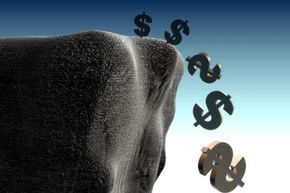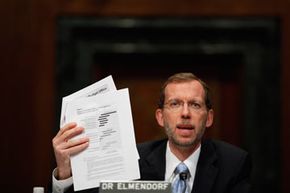 “The fiscal cliff describes a series of U.S. tax increases and budget cuts scheduled to kick in during the first weeks of 2013 unless Congress acts to change them.Hemera/Thinkstock
“The fiscal cliff describes a series of U.S. tax increases and budget cuts scheduled to kick in during the first weeks of 2013 unless Congress acts to change them.Hemera/Thinkstock
Americans may have very little to celebrate on New Year’s Day 2013. If Congress is unable or unwilling to come to a compromise on scheduled tax increases — the largest in 40 years — and painful automatic budget cuts, the nation’s economy will be pushed over a "fiscal cliff" in 2013. Before we get into the potentially devastating effects of that cliff, let’s explain what the term means and how Americans arrived on the edge of economic free fall.
Federal Reserve chief Ben Bernanke was the first to use the term fiscal cliff to describe a series of tax increases and budget cuts that are scheduled to kick in during the first weeks of 2013 [source: Montgomery]. If allowed to happen, the nation would almost surely plunge back into recession, according to the nonpartisan Congressional Budget Office [source: O’Keefe]. Another colorful term for the apocalyptic economic moment is "taxmageddon."
But why would Congress have passed legislation that would put the U.S. in such a mess? To answer that question, we have to go back to the debt ceiling crisis of 2011. Congress is the one that authorizes the U.S. Treasury to borrow money to pay for federal programs. When the Treasury reaches its borrowing limit, it asks Congress to raise the limit by a few hundred billion dollars, which Congress has done dozens of times [source: The New York Times].
In 2011, however, fiscally conservative tea party Republicans in the House of Representatives refused to pass any legislation that raised the national debt. They were also opposed to any debt-reduction plan that included tax increases. Without the ability to borrow money or raise tax revenue, the Treasury couldn’t pay off its other debts, meaning the federal government was poised to default.
Despite months of feverish negotiations, the White House and Congress were deadlocked. In a last-minute fix, the two sides agreed to $2.4 trillion in budget cuts over the next 10 years. Only $900 billion of those cuts would be made immediately. The rest would begin automatically in early January 2013 unless the two sides could negotiate a better deal in the interim [source: The New York Times]. When a nonpartisan congressional "supercommittee" failed to reach a compromise, negotiations were tabled until after the 2012 presidential elections.
As of this writing, there is still no deal to avoid the automatic spending cuts scheduled for 2013. There is also no agreement on whether or not to extend the Bush-era tax cuts past the end of 2012. If no action is taken on these two fronts, there could be grave economic effects. We’ll detail the damage on the next page.
Economic Effects of the Fiscal Cliff
In an election year when Republicans and Democrats agree on very little, both sides warn that allowing the economy to run off the fiscal cliff would be ruinous. The Congressional Budget Office concurs, calculating that a combination of large tax increases and deep budget cuts would raise unemployment levels higher than 9 percent and sink the economy into another recession [source: O’Keefe].
The fiscal cliff will be so damaging to the U.S. economy because it slows down two critical engines of the economy: consumer spending and government spending.
Consumer spending will decrease because a greater chunk of Americans’ paychecks will go to taxes. In 2010, President Obama extended the Bush-era tax cuts through 2012. If allowed to expire, 90 percent of Americans would see their tax rates go up by an average of $3,500 per family [source: Montgomery]. That amounts to cutting 6 percent from each paycheck. With less money in their pockets, consumers will buy less stuff. When companies sell less, they cut jobs, investors back off and the economy shrinks. Bad news all around.
Then there are the budget cuts. Unless Congress comes up with an alternative deficit-reduction plan, it will have to make deep budget cuts to federal programs in January 2013. These cuts, amounting to $109 billion a year from 2013 to 2021, will affect federal programs across the board, but defense spending will take the biggest hit [source: Khimm]. Defense programs will see a 9.4 percent reduction in spending, or roughly $55 billion a year [source: Grant]. Non-defense programs will also be cut by an average of 8.2 percent, including popular programs like special education and Medicare [source: Weisman].
When the government spends less money, the economy suffers. Defense contractors that make the planes and ships for the military will see their orders drop. Hospitals that rely on Medicare payments will have to cut staff, as will public schools that count on government-funded special education programs. This is why the CBO expects unemployment to surge past 9 percent if budget cuts are allowed to proceed as planned.
The only economic upside of the fiscal cliff is that it would significantly lower the federal budget deficit. The projected deficit for 2013 would drop to $641 billion if America runs off the fiscal cliff. If the U.S. avoids the cliff, it will be $1 trillion. This could translate to a debt-to-GDP ratio of 58 percent in 2022 as opposed to one of 90 percent without the cliff [source: Kurtzleben].
In a perfect political world, Congress would pass legislation that trims the deficit without inflicting so much pain on the economy. But we live in the real world. On the next page, we’ll look at a few different scenarios for steering clear of the fiscal cliff.
How to Avoid the Fiscal Cliff
 “U.S. Congressional Budget Office director Doug Elmendorf testifies before the Senate Budget Committee while presenting the CBO’s policy options for increasing economic growth and employment. Will Congress listen?hip Somodevilla/Getty Images
“U.S. Congressional Budget Office director Doug Elmendorf testifies before the Senate Budget Committee while presenting the CBO’s policy options for increasing economic growth and employment. Will Congress listen?hip Somodevilla/Getty Images
How does America avoid falling off the fiscal cliff? Easy — Congress and the White House need to reach a sensible compromise on tax increases and spending cuts to reduce the deficit. On second thought, maybe it’s mission impossible. This is exactly what the two sides were trying to do during the debt ceiling debacle of 2011, and the best solution they could come up with was creating the fiscal cliff. Will they be spooked enough by their own scare tactic to forge a bipartisan solution?
The first challenge is figuring out what to do about those Bush-era tax cuts set to expire at the end of the year. President Obama will have to address this even before his second inauguration on Jan. 20, 2013.
Obama’s plan relies on a combination of increased tax revenue and budget cuts to lower the deficit. Under Obama’s tax plan, the current tax rates would remain the same for all households earning less than $250,000. Joint filers earning more than $250,000 a year would see their rates increase from 33 to 36 percent. Households earning more than $390,050 would experience a rate increase from 36 to 39 percent [source: Tax Policy Center]. Another significant change would be taxing investment income, currently a flat 15 percent, at the same rate as earned income. The corporate tax rate, however, would be lowered.
Experts agree that it’s unlikely that politicians will let America slip over the fiscal cliff. Another recession is political poison for both parties, no matter who is in the White House. If the debt ceiling debate was any indication, the squabbling and dealmaking will go right down to the wire, with both sides blaming the other for any deficiencies in the final deal. Happy 2013, America!
Lots More Information
Author’s Note: How the Fiscal Cliff Works
This is hardly a hopeful time in American politics. According to the latest Gallup poll, only 10 percent of Americans approves of the job that Congress is doing. It’s not hard to understand why. As the debt ceiling crisis proved in 2011, the political parties are seemingly divided beyond hope for reasonable compromise. As the fiscal cliff looms only months away, one could be excused for doubting our government’s ability to cross the aisle in the name of collective economic security. It would be more than embarrassing for American politics if partisanship triggered another recession (both domestic and global); it would be an entirely avoidable tragedy.
Related Articles
- How the Bush-Era Tax Cuts Work
- How Trickle-Down Economics Works
- How Recessions Work
- How Income Taxes Work
- How Tax Deductions Work
- How Debt Works
- How does President Obama plan to fix the federal deficit?
Sources
- Grant, David. The Christian Science Monitor. "Everything you need to know about budget ‘sequestration’ — except the consequences." Sept. 15, 2012. (Oct. 10, 2012). http://www.csmonitor.com/USA/DC-Decoder/2012/0915/Everything-you-need-to-know-about-budget-sequestration-except-the-consequences
- Khimm, Suzy. The Washington Post. "The sequester, explained." Sept. 14, 2012. (Oct. 10, 2012). http://www.washingtonpost.com/blogs/ezra-klein/wp/2012/09/14/the-sequester-explained/
- Kurtzleben, Danielle. U.S. News and World Report. "CBO: Fiscal Cliff Effects Now Look Worse." August 22, 2012. (Oct. 10, 2012). http://www.usnews.com/news/articles/2012/08/22/cbo-fiscal-cliff-effects-now-look-worse
- Montgomery, Lori. The Washington Post. "Report: Nearly 90 percent of Americans would see taxes rise if ‘fiscal cliff’ hits." Oct. 1, 2012. (Oct. 10, 2012). http://www.washingtonpost.com/business/economy/americans-would-pay-536-billion-more-in-taxes-if-congress-doesnt-act-on-fiscal-cliff-report-says/2012/10/01/e5e0635a-0bdc-11e2-bb5e-492c0d30bff6_story.html
- The New York Times. "Times Topics: Federal Debt Ceiling" (Oct. 10, 2012) http://topics.nytimes.com/topics/reference/timestopics/subjects/n/national_debt_us/index.html
- O’Keefe, Ed. The Washington Post. "Explaining the ‘fiscal cliff.’" Oct. 5, 2012. (Oct. 10, 2012). http://www.washingtonpost.com/video/thefold/explaining-the-fiscal-cliff/2012/10/05/e00f04d0-0f2f-11e2-bb5e-492c0d30bff6_video.html
- Tax Policy Center. "2013 Budget: Tax Proposals" (Oct. 10, 2012) http://www.taxpolicycenter.org/taxtopics/2013-Allow-top-two-rates-to-rise.cfm
- Tax Policy Center. "The Romney Plan" (Oct. 10, 2012) http://www.taxpolicycenter.org/taxtopics/romney-plan.cfm
- Weisman, Jonathan. The New York Times. "White House Details Potential Effects if Budget Cuts Go Through." Sept. 14, 2012. (Oct. 10, 2012). http://www.nytimes.com/2012/09/15/us/politics/white-house-report-details-effects-of-automatic-budget-cuts.html


